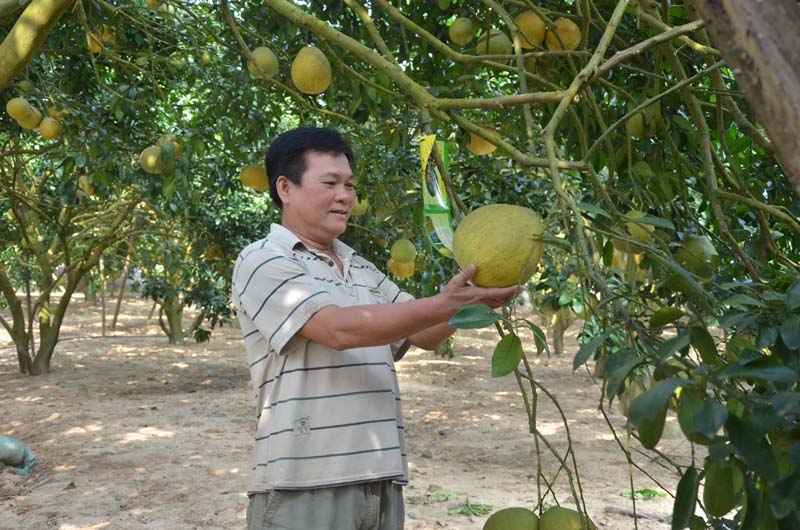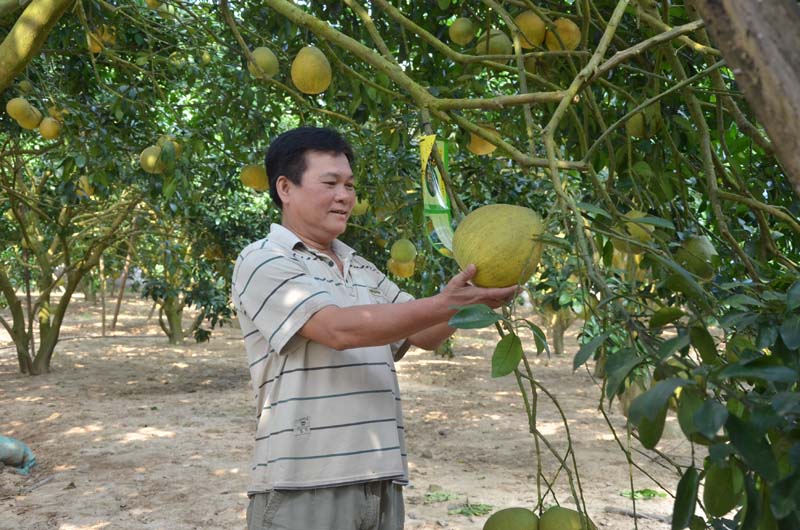
(HBO) – Tan Lac district of the northern mountainous province of Hoa Binh is home to about 1,046 ha of pomelo, with 395 ha currently ready for harvest.
According to estimates of the People’s Committee of the district, productivity of pomelo in the 2018-2019 crop will be lower compared to the same period last year due to impact of natural factors. However, pomelo remains the district’s major plant with the most significant economic values.

Household cultivating Tan Lac red pomelo in Dong Tien village
(Dong Lai commune) harvest the fruit with delight. It yields high productivity,
high quality and its price stands at about 12,000-25,000 VND (0.15-1.07 USD)
per fruit.
Specifically, this year,
each ha of red pomelo yields an average of 35,000 fruits, equivalent to a productivity
of 30 tonnes per ha. With the most-common price of about 15,000 VND per fruit,
a crop generates an average income of 525 million VND (22,440 USD) per hectare.
For the green-skin pomelo,
with an average productivity of 15,000 fruits per hectare, or 20 tonnes per ha,
it is sold at 30,000 VND per kg, generating an income of 600 million VND (nearly
25,650 USD) per ha a crop.
A citrus festival and agricultural fair in the province is expected to
be held in mid-December 2018, which falls in the harvest time of Tan Lac
pomelo.
Therefore, the district is set to attend the fair with eight booths
introducing its staples like red and green-skin pomelo. Other farm produce such
as chayote, garlic, onion, and Quyet Chien organic vegetables, among others,
will also be on show./.
According to data from the Hoa Binh Provincial Party Committee, the industrial production index for the first six months of 2025 is estimated to have increased by 20% compared to the same period last year. This marks the highest year-on-year growth rate for this period since 2020.
In the first six months of 2025, Hoa Binh province’s export turnover was estimated at 1.145 billion USD, marking an 18.11% increase compared to the same period in 2024. Import turnover was estimated at $ 804 million, a 17.15% increase, which helped the province maintain a positive trade balance.
The lives of the ethnic minority farmers in Tan Lac district have gradually improved thanks to the new directions in agricultural production. This is a testament to the collective strength fostered through the professional associations and groups implemented by various levels of the district’s Farmers’ Union.
With the motto the "product quality comes first,” after nearly one year of establishment and operation, Muong village’s Clean Food Agricultural and Commercial Cooperative, located in Cau Hamlet, Hung Son Commune (Kim Boi district), has launched reputable, high-quality agricultural products to the market that are well-received by consumers. The products such as Muong village’s pork sausage, salt-cured chicken, and salt-cured pork hocks have gradually carved out a place in the market and they are on the path to obtaining the OCOP certification.
In the past, the phrase "bumper harvest, rock-bottom prices" was a familiar refrain for Vietnamese farmers engaged in fragmented, small-scale agriculture. But today, a new spirit is emerging across rural areas of Hoa Binh province - one of collaboration, organisation, and collective economic models that provide a stable foundation for production.
Maintaining growing area codes and packing facility codes in accordance with regulations is a mandatory requirement for agricultural products to be eligible for export. Recently, the Department of Agriculture and Environment of Hoa Binh province has intensified technical supervision of designated farming areas and packing facilities to safeguard the "green passport" that enables its products to access international markets.



